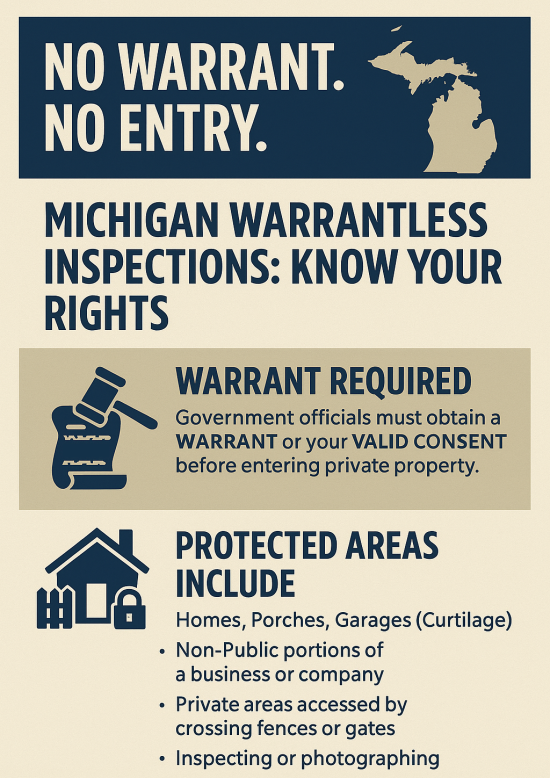Michigan’s Requirements for Government Searches & Inspections
When the government crosses a property line, the Constitution crosses with it.
Overview
Under the Fourth Amendment and Article I, Section 11 of the Michigan Constitution, officials generally must obtain a warrant — or your validly obtained consent — before entering private property. Titles like “code enforcement” or “administrative inspection” do not erase the warrant requirement. This page explains the legal background to protect your rights.
The Fourth Amendment protects “persons, houses, papers, and effects” against unreasonable searches. Michigan’s Constitution echoes that promise in Article I, Section 11. Together they impose a straightforward rule: absent consent or a recognized exception, entry onto unlicensed areas of private property requires judicial authorization.

When Officials Must Obtain a Warrant
The United States Supreme Court in Camara v. Municipal Court have established and Sixth Circuit decisions like Mockeridge v. Harvey have confirmed that “administrative” inspections and searches are subject to Fourth Amendment limits. The Michigan Constitution follows the same principle (and protects slightly more).
Government officials must obtain permission, a warrant, or invoke on the few narrow exceptions to the Fourth Amendment when:
- Entering a home, porch, garage, or outbuilding within the curtilage;
- Entering a nonpublic portion of business or company;
- Crossing fences or gates to access non-public areas;
- Inspecting or photographing conditions not visible from public vantage points;
- Accessing private commercial spaces not open to the public.
Administrative vs. Criminal Searches
Governments sometimes argue that compliance or “administrative” checks are different. But the Constitution looks to conduct, not labels. If officials intend to enter private space, a warrant or valid consent is ordinarily required. Recent federal appellate guidance has reaffirmed that convenience cannot replace constitutional process.
What the Courts Have Broadly Said
The federal courts have spoken clearly: government convenience does not erase constitutional privacy protections. In Camara v. Municipal Court (1967), the United States Supreme Court held that even so-called “administrative” inspections — such as housing or code checks — are searches within the meaning of the Fourth Amendment. Before officials may enter a private portions of a home or business, they must first obtain a warrant from a neutral judge. That rule became the foundation of modern inspection law.
The Sixth Circuit has since reaffirmed that promise. In Morgan v. Fairfield County (2018), the federal court condemned a county’s effort to invade private property without a warrant, explaining that the home and its curtilage remain sacred under the Fourth Amendment. A year later, in Gardner v. Evans (2019), the Sixth Circuit again rejected warrantless intrusions, emphasizing that government officials cannot invent exemptions for routine enforcement. Most recently, in Mockeridge v. Harvey (2025) — a case successfully litigated by attorney Philip L. Ellison — the Sixth Circuit reaffirmed that inspectors who enter private land without judicial authority violate clearly established law. Together these decisions leave no doubt: in Michigan, as across the nation, state and federal constitutions protections still guard our doorways.
Your Remedies if an Inspection Occurred
If a government inspector has already entered your property without a warrant or your permission, the law still provides real remedies.
A homeowner or business owner may seek injunctive relief to prevent future unauthorized entries, ensuring that officials respect constitutional limits going forward. You may also be entitled to recover damages for the violation of your Fourth Amendment rights, compensating you for the intrusion and any resulting harm. In addition, prevailing citizens may recover attorney fees under 42 U.S.C. § 1988(b), which helps level the playing field when standing up to government misconduct.
Every case begins with documentation, i.e., record dates, names, photographs, body-cam or surveillance videos, and any documents created. Preserve all these. Promptly secured documentation strengthens your legal position. The sooner these facts are preserved, the stronger your ability to vindicate your rights in court.
Was Your Property Inspected Without a Warrant?
You may be entitled to damages or injunctive relief. Tell us what happened.
Case Review